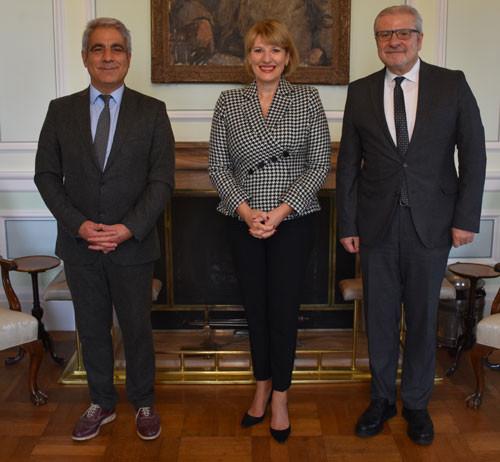MARUF BUZCUGIL, HUSEYIN GOKCE
UK Ambassador to Ankara Jill Morris called on Turkish companies to contribute to the Free Trade Agreement (FTA) between Turkey and the UK.
Ahead of the update of the Free Trade Agreement, the British Embassy has called on the Turkish business community to share their views on what elements should be included in the agreement. Companies will be able to send their views via the website.
Ahead of talks on updating the Free Trade Agreement signed between Turkey and the United Kingdom in 2020 to include the services sector, the British Embassy has launched a new study. The Embassy has issued a ‘call for contributions’ to the Turkish business community, including views on which elements should be added to the agreement.
UK Ambassador Jill Morris answered ECONOMİ daily’s questions before the talks. Stating that the UK and Turkey’s plans to start negotiations for an updated free trade agreement worthy of the 21st century are very important, Morris called on Turkish companies to contribute to the content of the FTA. Sharing the website created on the subject, Morris stated that the right trade agreement that will benefit the business world is very important. Noting that trade between the two countries is at an important level, Ambassador Morris underlined that there are very clear opportunities for greater business partnerships in the coming period.
Here is the Q&A with UK Ambassador Jill Morris:
What has changed in the UK economy since the completion of BREXIT?
Since leaving the European Union, the UK has pursued an independent trade policy, and we have tailored our approach to the needs of the UK economy. As a result, the UK now has over 70 trade agreements. But we want to go further in expanding our business and trade links with the world, and that’s why we welcome the announcement in July that the UK and Turkey will begin negotiations on a new modernized Free Trade Agreement (FTA). Consistently the largest recipient of foreign investment in Europe, the UK economy has shown its resilience in the face of global pressures. Since 2010, the UK has had the third-fastest growth among the G7 countries.
Can you give an overview of the Free Trade Agreement between Turkey and the UK? What has this agreement brought to both countries?
On December 29, 2020, our countries signed the Free Trade Agreement.This agreement entered into force on January 1, 2021 and is a continuation of a series of agreements that governed our trade relations when we were members of the EU. The agreement laid the foundation for our trade relationship. But it does not cover important sectors such as services and we want to go further. That’s why in July the UK and Turkey announced plans to start negotiations on an updated free trade agreement fit for the 21st century, better suited to the modern and dynamic economies of both countries. In the meantime, the trade relationship between our countries has grown stronger. Our total trade volume reached £23.5 billion in 2022, an increase of more than 30% on the previous year, and by the end of June 2023 it was £23.8 billion, making Turkey one of the UK’s top 20 trading partners.
Why does the Free Trade Agreement need to be updated and expanded? Could you be a bit more specific?
After the UK-Turkey Trade Agreement was signed in 2020, both countries undertook an assessment exercise and concluded that it would be beneficial to broaden and deepen our trade relationship. This was partly because the agreement only covered merchandise and did not cover key and growing areas of both countries’ economies, such as digital, data and services. These are crucial sectors at a time when we are moving to a much better-connected world, and any increase in the volume of business in these areas can only be positive for business in both the UK and Turkey.
After which stage is the update process expected to be completed?
Before the official start of negotiations, the UK has launched a “Call for Contributions” to get ideas on what we should include in our new trade deal. We want to hear from businesses about the areas they want to prioritize, the challenges they face and the areas where they would most like to see progress. The call for contributions will run for eight weeks and I urge anyone who has a view to contribute, after which we hope to be able to start negotiations next year.But it is important that there is no timetable for completion. Because these are very technical and far-reaching negotiations that will involve literally every sector of the economy. So it’s important to make sure that we get the right trade agreement that works for business, rather than forcing people to complete the negotiations on a predetermined timetable.
What changes will the new version of the Free Trade Agreement bring to bilateral trade? What will be the mutual benefits?
We are really excited about what the new agreement will deliver. Turkey is not only a major trading partner for the UK, but also a strong NATO ally and strategic partner. Any expansion of our trade relationship will strengthen our relationship overall.I urge everyone to participate fully in this call for contributions so that we can understand where we need to focus our efforts to expand our trade further. With trade now at £23.8 billion, we have clear opportunities to forge even greater business partnerships and collaboration across sectors, and this progress will continue to generate jobs and economic growth for our countries.










